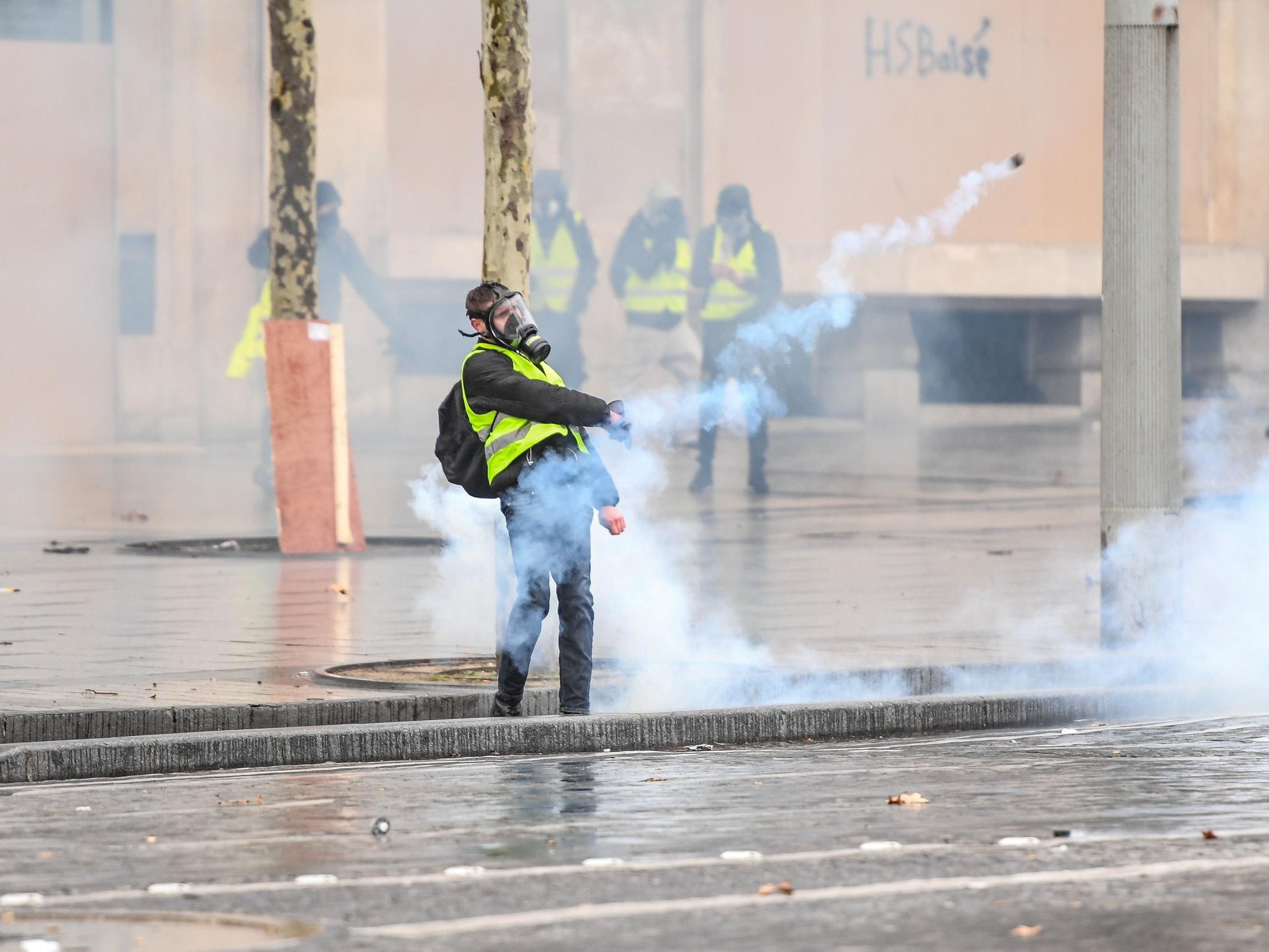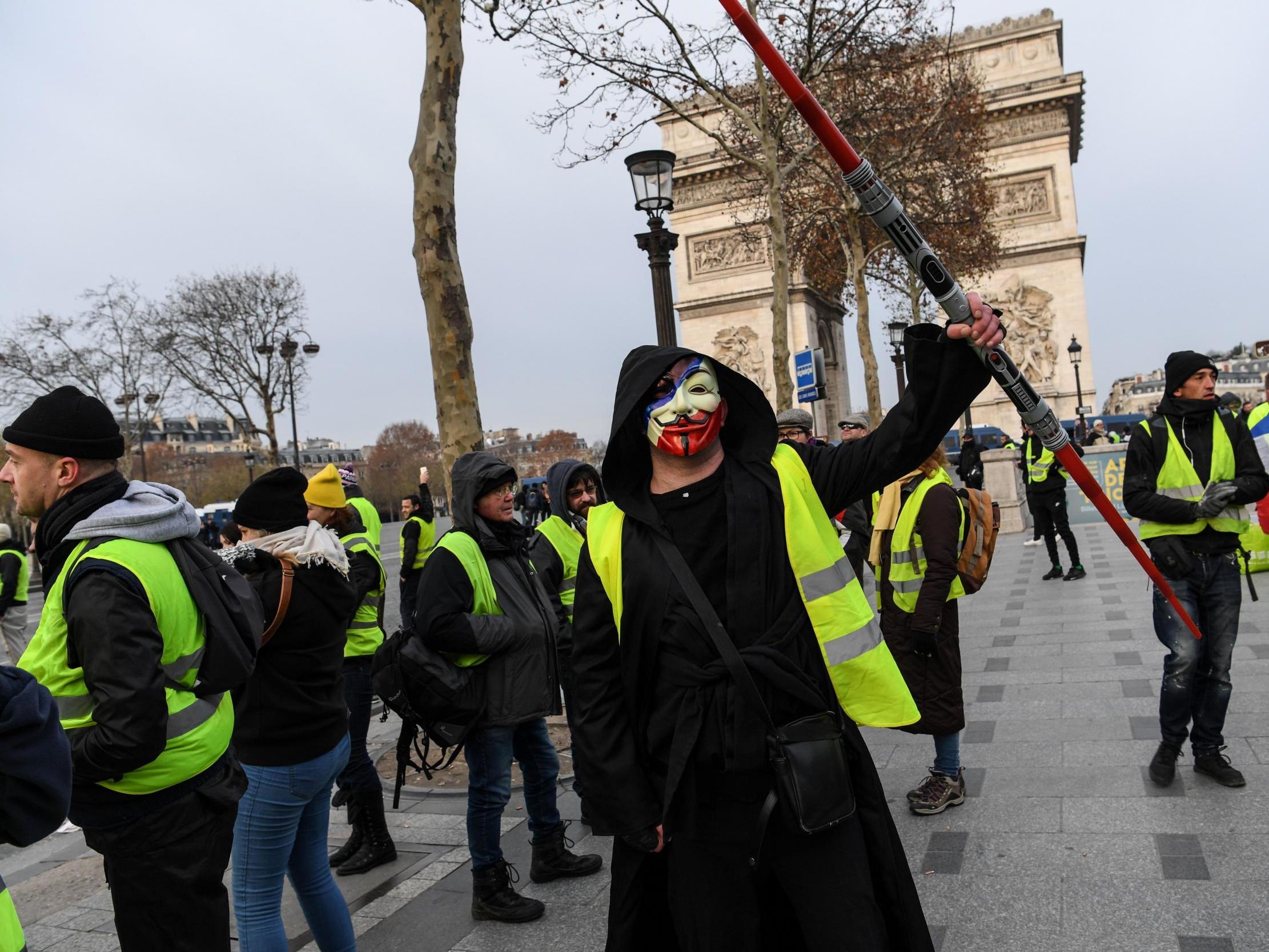Paris protests: French police fire tear gas in fifth weekend of 'yellow vest' demonstrations
'We're being bled dry,' protester says

Your support helps us to tell the story
From reproductive rights to climate change to Big Tech, The Independent is on the ground when the story is developing. Whether it's investigating the financials of Elon Musk's pro-Trump PAC or producing our latest documentary, 'The A Word', which shines a light on the American women fighting for reproductive rights, we know how important it is to parse out the facts from the messaging.
At such a critical moment in US history, we need reporters on the ground. Your donation allows us to keep sending journalists to speak to both sides of the story.
The Independent is trusted by Americans across the entire political spectrum. And unlike many other quality news outlets, we choose not to lock Americans out of our reporting and analysis with paywalls. We believe quality journalism should be available to everyone, paid for by those who can afford it.
Your support makes all the difference.Police officers fired tear gas at protesters on the Champs Elysees boulevard in Paris on Saturday during a fifth consecutive weekend of anti-government unrest in France.
Clashes also broke out outside the city’s opera house as thousands of people marched through the French capital but the protests remained largely peaceful overall.
Eighty-six people in Paris had been detained by police officers by mid-afternoon and security forces had blocked off some streets in an effort to contain the unrest.
A handful of topless feminist activists braved chilly temperatures to face off with security forces, a few meters away from the Elysee Palace, the president’s residence.
French media also broadcast footage of clashes between police and protesters in the cities of Nantes and Bordeaux.
Previous protests associated with the “yellow vest” movement have turned violent, with Paris suffering its worst riot in decades on 1 December.
The number of deaths connected to the protests rose to seven, after a man died at France’s border with Belgium when he crashed his car into a truck that had stalled at a “yellow vest” roadblock.
Last weekend, groups of demonstrators looted stores in Paris and set up burning barricades in the streets.
“Our country needs calm. It needs order. It needs to function normally again,” Emmanuel Macron, the French president, said on Friday.
The Interior Minister said around 69,000 police were active on Saturday with a reinforced presence in the cities of Toulouse, Bordeaux and Saint-Etienne.
According to official figures, 33,500 protesters had been counted in France by 1300 GMT compared to 77,000 at the same time on 8 December.
In Paris, more than 2,000 protestors marched in splintered groups in several neighbourhoods, and at least 148 were arrested by mid-afternoon, according to a Paris police official.
Police said 115 people were taken into custody in Paris, most for banding together to commit acts of violence, and a small number were injured. Police in riot gear tackled one protester and dragged him off the Champs-Elysees, while his friends said he was doing nothing but exercising right to protest.

The “yellow vest” demonstrations began on 17 November. Marchers were initially protesting a rise in fuel tax.
The controversial tax was scrapped as the protests grew, but the movement has since broadened to encompass widespread anger and dissatisfaction aimed at Mr Macron’s government.
Many marchers feel that the French leader governs for the country’s elites and the 40-year-old has struggled to convince them otherwise
There was a strong police presence Saturday outside the central Saint Lazare train station, where police in riot gear checked bags.
Some 8,000 security forces and 14 armoured vehicles were deployed in Paris alone, authorities said.
“We’re here to represent all our friends and members of our family who can’t come to protest, or because they’re scared,” said Pierre Lamy, a 27-year-old industrial worker attending the march on Saturday.
He said the protests had stopped being about the fuel tax and had turned into a movement for economic justice.
“Everything’s coming up now,” Mr Lamy said. “We’re being bled dry.”
1,407 people have been injured since the protests began.

On Friday, the French government’s official Twitter account posted a video of images of historic national protests, which then transitioned to more recent footage of the “yellow vest” demonstrations.
“Protesting is a right. So let’s know how to exercise it,” the account said.
“Protesting is not smashing,” the video declared. “Protesting is not smashing our heritage. Protesting is not smashing our businesses.”
Mr Macron admitted in a landmark speech this week that he was partially responsible for the anger felt by the marchers.
But he refused to reinstate a wealth tax, which he controversially removed in 2017 in a bid to encourage investment.
“I don’t think our democracy can accept to function with a dialogue that is carried out only with the occupation of the public domain, only by elements of violence,” the French leader said.
He has ignored protesters’ calls for his resignation.
Additional reporting by agencies
Join our commenting forum
Join thought-provoking conversations, follow other Independent readers and see their replies
Comments